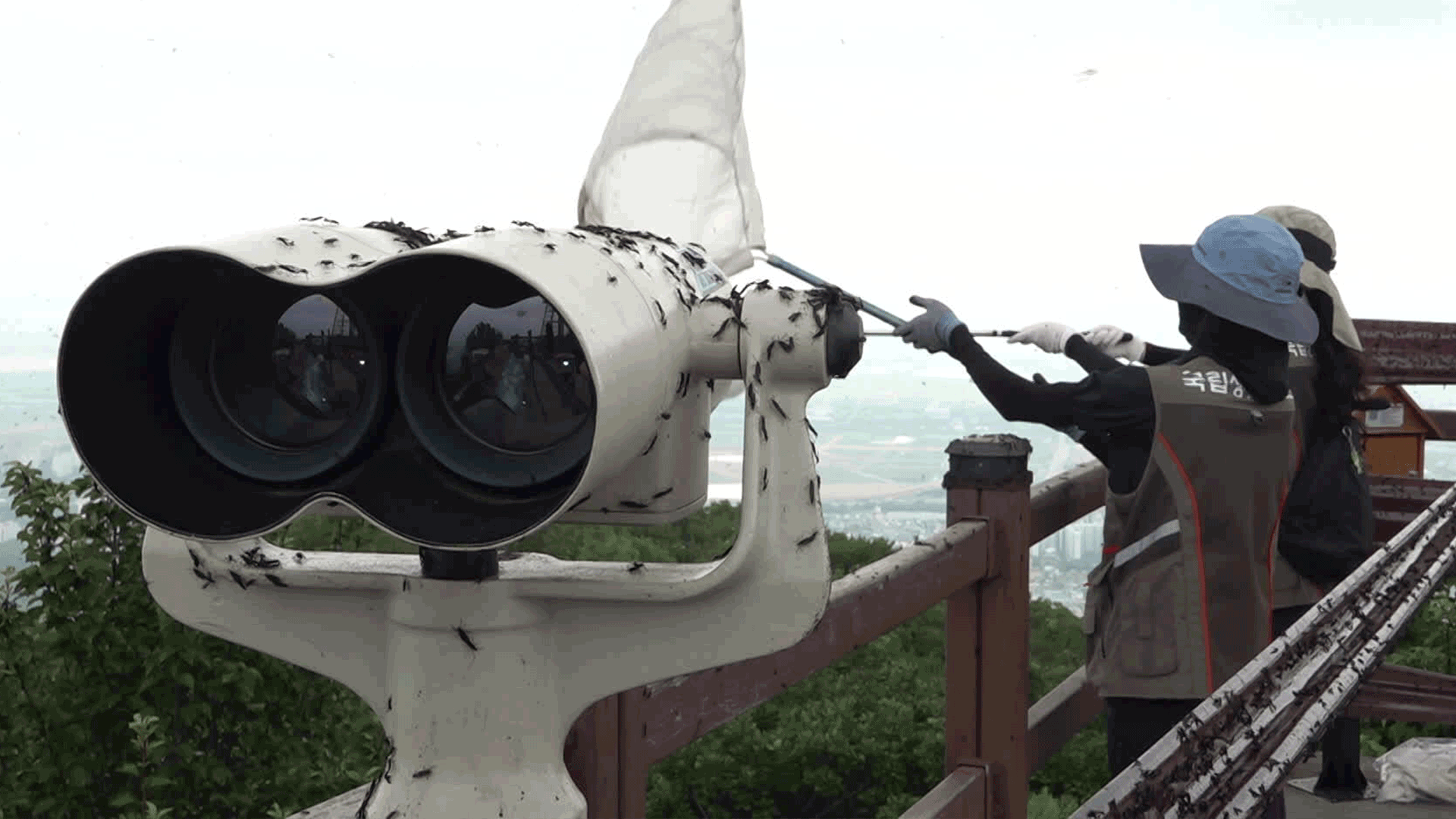[Anchor]
A mass outbreak of lovebugs in the Seoul metropolitan area has prompted both local governments and the central government to step in with pest control measures.
Authorities are struggling to contain the insect invasion, and experts warn that if climate change continues, lovebugs could spread across the entire Korean Peninsula within the next 50 years.
Here’s reporter Shin Bang-sil with the details.
[Report]
Lovebugs have overrun the summit of this mountain for more than a week.
As complaints flood in, not only local governments but also the Ministry of Environment have launched pest control efforts.
Workers swing insect nets and sweep the bugs with brooms, but they continue to swarm in.
Lovebugs are reportedly resistant to insecticides, making chemical control ineffective, and they currently have no known natural predators in Korea.
Authorities are left hoping time will naturally reduce their numbers.
[Park Sun-jae / Environmental Researcher, National Institute of Biological Resources: “About a week to ten days after their explosive emergence, the population tends to decline. We expect the situation to stabilize by mid-July.”]
Lovebugs are native to subtropical climates.
Genetic analysis suggests they likely migrated from southern China to the Shandong Peninsula and were introduced to Korea through trade.
They were first spotted in Incheon in 2015, and as climate change has made survival more viable, large outbreaks have occurred annually in the Seoul area since 2022.
[Shin Seung-kwan/Professor of Biological Sciences, Seoul National University: “They’re attracted to light, so they often enter cities. And due to the urban heat island effect, the larvae may survive the winter more easily.”]
A recent study predicts that if global warming continues, lovebugs could expand their habitat across all of Korea by 2070.
As climate change intensifies, researchers stress the urgent need for population control strategies and a national pest management manual.
This is Shin Bang-sil, KBS News.
A mass outbreak of lovebugs in the Seoul metropolitan area has prompted both local governments and the central government to step in with pest control measures.
Authorities are struggling to contain the insect invasion, and experts warn that if climate change continues, lovebugs could spread across the entire Korean Peninsula within the next 50 years.
Here’s reporter Shin Bang-sil with the details.
[Report]
Lovebugs have overrun the summit of this mountain for more than a week.
As complaints flood in, not only local governments but also the Ministry of Environment have launched pest control efforts.
Workers swing insect nets and sweep the bugs with brooms, but they continue to swarm in.
Lovebugs are reportedly resistant to insecticides, making chemical control ineffective, and they currently have no known natural predators in Korea.
Authorities are left hoping time will naturally reduce their numbers.
[Park Sun-jae / Environmental Researcher, National Institute of Biological Resources: “About a week to ten days after their explosive emergence, the population tends to decline. We expect the situation to stabilize by mid-July.”]
Lovebugs are native to subtropical climates.
Genetic analysis suggests they likely migrated from southern China to the Shandong Peninsula and were introduced to Korea through trade.
They were first spotted in Incheon in 2015, and as climate change has made survival more viable, large outbreaks have occurred annually in the Seoul area since 2022.
[Shin Seung-kwan/Professor of Biological Sciences, Seoul National University: “They’re attracted to light, so they often enter cities. And due to the urban heat island effect, the larvae may survive the winter more easily.”]
A recent study predicts that if global warming continues, lovebugs could expand their habitat across all of Korea by 2070.
As climate change intensifies, researchers stress the urgent need for population control strategies and a national pest management manual.
This is Shin Bang-sil, KBS News.
■ 제보하기
▷ 카카오톡 : 'KBS제보' 검색, 채널 추가
▷ 전화 : 02-781-1234, 4444
▷ 이메일 : kbs1234@kbs.co.kr
▷ 유튜브, 네이버, 카카오에서도 KBS뉴스를 구독해주세요!
- Lovebug outbreak worsens
-
- 입력 2025-07-04 23:59:26

[Anchor]
A mass outbreak of lovebugs in the Seoul metropolitan area has prompted both local governments and the central government to step in with pest control measures.
Authorities are struggling to contain the insect invasion, and experts warn that if climate change continues, lovebugs could spread across the entire Korean Peninsula within the next 50 years.
Here’s reporter Shin Bang-sil with the details.
[Report]
Lovebugs have overrun the summit of this mountain for more than a week.
As complaints flood in, not only local governments but also the Ministry of Environment have launched pest control efforts.
Workers swing insect nets and sweep the bugs with brooms, but they continue to swarm in.
Lovebugs are reportedly resistant to insecticides, making chemical control ineffective, and they currently have no known natural predators in Korea.
Authorities are left hoping time will naturally reduce their numbers.
[Park Sun-jae / Environmental Researcher, National Institute of Biological Resources: “About a week to ten days after their explosive emergence, the population tends to decline. We expect the situation to stabilize by mid-July.”]
Lovebugs are native to subtropical climates.
Genetic analysis suggests they likely migrated from southern China to the Shandong Peninsula and were introduced to Korea through trade.
They were first spotted in Incheon in 2015, and as climate change has made survival more viable, large outbreaks have occurred annually in the Seoul area since 2022.
[Shin Seung-kwan/Professor of Biological Sciences, Seoul National University: “They’re attracted to light, so they often enter cities. And due to the urban heat island effect, the larvae may survive the winter more easily.”]
A recent study predicts that if global warming continues, lovebugs could expand their habitat across all of Korea by 2070.
As climate change intensifies, researchers stress the urgent need for population control strategies and a national pest management manual.
This is Shin Bang-sil, KBS News.
A mass outbreak of lovebugs in the Seoul metropolitan area has prompted both local governments and the central government to step in with pest control measures.
Authorities are struggling to contain the insect invasion, and experts warn that if climate change continues, lovebugs could spread across the entire Korean Peninsula within the next 50 years.
Here’s reporter Shin Bang-sil with the details.
[Report]
Lovebugs have overrun the summit of this mountain for more than a week.
As complaints flood in, not only local governments but also the Ministry of Environment have launched pest control efforts.
Workers swing insect nets and sweep the bugs with brooms, but they continue to swarm in.
Lovebugs are reportedly resistant to insecticides, making chemical control ineffective, and they currently have no known natural predators in Korea.
Authorities are left hoping time will naturally reduce their numbers.
[Park Sun-jae / Environmental Researcher, National Institute of Biological Resources: “About a week to ten days after their explosive emergence, the population tends to decline. We expect the situation to stabilize by mid-July.”]
Lovebugs are native to subtropical climates.
Genetic analysis suggests they likely migrated from southern China to the Shandong Peninsula and were introduced to Korea through trade.
They were first spotted in Incheon in 2015, and as climate change has made survival more viable, large outbreaks have occurred annually in the Seoul area since 2022.
[Shin Seung-kwan/Professor of Biological Sciences, Seoul National University: “They’re attracted to light, so they often enter cities. And due to the urban heat island effect, the larvae may survive the winter more easily.”]
A recent study predicts that if global warming continues, lovebugs could expand their habitat across all of Korea by 2070.
As climate change intensifies, researchers stress the urgent need for population control strategies and a national pest management manual.
This is Shin Bang-sil, KBS News.
-
-

신방실 기자 weezer@kbs.co.kr
신방실 기자의 기사 모음
-
이 기사가 좋으셨다면
-
좋아요
0
-
응원해요
0
-
후속 원해요
0











![[속보] ‘31.8조 규모’ 이재명 정부 첫 추경 국무회의 의결](/data/layer/904/2025/07/20250705_AHdq3h.jpg)



이 기사에 대한 의견을 남겨주세요.